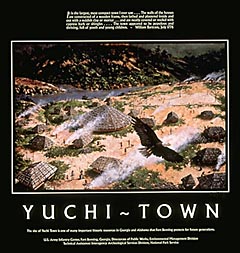

Yuchi, a.k.a. Hogologe, Uchee.
An Overview

Yuchi Town, 1776
Public awareness poster prepared the National Park Service
for the U.S. Army, Fort Benning, Georgia
Oil painting by Martin Pate



|
Tennessee’s Big Valley was the primary homeland of the Yuchi. In 1661 some Yuchi people may have moved into South Carolina, living along the Savannah River. In 1715 the Yuchi fought with the Yemassee and other tribes against white settlers in the Yemassee War (South Carolina).
In 1751 some Yuchis left South Carolina, and moved west to join the Muscogee-Creeks. Our Linguistic Stocks of American Indians map places the Yuchi in Georgia, and the Nation Park Service has offered a poster of a painting, titled Yuchi Town, 1776 (seen at the top of this page). According to the NPS, “Yuchi Town was a thriving Native American community in the 1700s on land now occupied by Fort Benning.”
The Yuchi are considered by some as extinct as a tribe, however there are still few living representatives who speak the language. The language at least is about to become extinct. Efforts have been made to have get federal acknowledgment of the Yuchi Tribal Organization. While that question is beyond the scope of our genealogy and history website, because there is not an over abundance of information on the Yuchi we are including an excerpt from a Bureau of Indian Affairs report against the Yuchi Tribal Organization. Incidently, genealogists with Yuchi ancestors should take note of the statement below about the mention of the Dawes Commission.
DEPARTMENT OF THE INTERIOR
Bureau of Indian Affairs
TECHNICAL REPORT
II Historical Background
The petitioning group, Yuchi Tribal Organization, Inc., is made up of individuals derived from the historical Yuchi tribe. This tribe joined the Muscogee (Creek) Confederacy, probably in two stages, in the late 18th or early 19th century (Wright 1951, Court of Claims 1956).(1)
Yuchis have maintained a political and legal relationship with the Muscogee (Creek) tribe since joining the Creek Confederacy. The Creek Confederacy united dozens of historic tribes yet preserved their ethnic distinctiveness by making them corporate groups responsible for most of their own affairs, particularly that of training and maintaining their own standing armies and maintaining their own ceremonial grounds. The incorporated tribes, which might consist of multiple settlements, were known as “talwas,” and later as “tribal towns.”
During the 18th and early 19th centuries, Yuchis were signatories to some Creek treaties with the United States. They were removed with the Creeks in the 1830’s from the banks of the Chattahoochee River in present-day Alabama to what is now Oklahoma. The Yuchi and other Creek tribal towns reestablished themselves, along ethnic lines, in the tribe’s new homelands following the removal (Opler 1937, 22). There were four Yuchi settlements in Oklahoma, reduced after 1900 to three (Wright 1951, 267, Speck 1909, 9).
The tribal towns became the basis for representation in both the House of Kings and the House of Warriors of the bicameral legislature of a Creek Nation government which was developed in 1867 (Opler 1937, 12). The Yuchi were represented in this government as a single town, one of 44 in the confederacy (Wright 1951, 267). Yuchi leaders participated actively in its affairs (Wright 1951, 267). A Yuchi leader built the first Creek Council House, a double log structure in what is now downtown Okmulgee (Tulsa Daily World, 1939).
The Act of April 26, 1906 (34 Stat. 137) allotted Creek lands in severalty and provided for the dissolution of the Creek tribal government. Yuchis were enrolled as Creek Indians on the roll of the Creek Nation created by the Dawes Commission. This roll, under the 1906 act, became the “final roll” of the Creek Nation. In 1976, the Federal court in Harjo v. Kleppe (U.S. District Court 1976) determined that the dissolution of the Creek Tribal government had not been statutorily accomplished and that in fact the Creek government had been explicitly perpetuated.
There continued after 1906 to be some Creek government activities and also some continued functioning of the tribal towns, including two Yuchi settlements (Opler 1937, 36). A principal chief was appointed by the President under the 1906 Act, sometimes based on elections or recommendations by representative bodies of Creeks. Three of the tribal towns organized in the 1930’s under the Oklahoma Indian Welfare Act. Debo (1940) indicates that organization of the Yuchi under the act was considered, but was never done.
